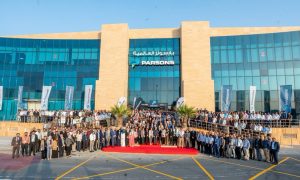TK Elevator transforms Madrid Airport as first fully remote-operated hub with MAX Automate
By PBB control, MAX Automate streamlines processes, enhances safety through advanced sensor and camera technology, and promotes sustainability by reducing vehicle movements and associated emissions

TK Elevator (TKE) has implemented its MAX Automate system at Adolfo Suárez Madrid-Barajas Airport in Spain. The technology is said to have made Madrid the world’s first major airport to remotely operate a total of 129 Passenger Boarding Bridges (PBBs) across its five terminals. By PBB control, MAX Automate streamlines processes, enhances safety through advanced sensor and camera technology, and promotes sustainability by reducing vehicle movements and associated emissions, said the firm.
Adolfo Suárez Madrid-Barajas Airport, Spain’s biggest airport, is one of the top five European airports and one of the busiest airports in the world. In 2024, it welcomed over 66m passengers. With the new MAX Automate system, the airport will be even more efficient for travelers. It’ll be simpler, safer, and better managed, making journey smoother, said a statement.
“MAX Automate represents a paradigm shift in airport operations,” said Ignacio Medina, CEO of Airport Solutions at TK Elevator. “By pioneering this system in Madrid, we’ve demonstrated how PBB automation can be implemented at scale and our commitment to driving digital transformation in the aviation industry. This solidifies TKE’s position as a leader in the PBB automation path. MAX Automate is an innovation that keeps evolving, pushing airports to move beyond traditional operations and adopt digital technologies that will shape the future of seamless, efficient airport management.”
MAX Automate integrates hardware and software for airport operations, offering three customisable levels of enhancement. The Remote Control System will assist operators to remotely control multiple PBBs from a single control station, eliminating the need for operator transfers. The Automatic Docking Assistance employs stereo cameras and advanced artificial vision algorithms to ensure precise and safe docking. The Remote Automatic Docking Assistance combines remote operation with automatic docking, providing convenience and reliability.

At Madrid Airport, the Remote Control System is operated from three dedicated control rooms, allowing staff to connect to and control all 129 PBBs. This approach optimises docking procedures, reduces turnaround times – a major cost factor in the industry and eliminates the need for operators to move between stands. The system further enhances operational efficiency by minimising downtime and enabling docking upon receiving the “OK handling” signal.
Beyond operational improvements, MAX Automate enhances safety by reducing human intervention during docking, lowering the risk of incidents and damage to PBBs and aircraft. Staff can become more specialised, opening new career paths for employees with disabilities. Sustainability is another advantage, as fewer operator transfers lead to reduced vehicle usage on the apron, CO₂ emissions and supporting airports in meeting their environmental goals.
As the step towards PBBs, MAX Automate underscores TK Elevator’s commitment to delivering innovative, fully integrated solutions. This lays airport operations and foundation for further advancements in airport automation and digitalisation, the company concluded.

























